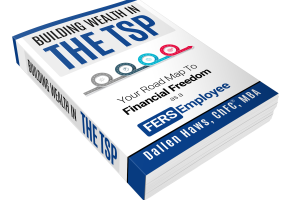What is your biggest expense in retirement?
For many people, it is taxes!
But most federal employees are shocked at what part of their incomes are taxable in retirement.
Spoiler Alert: Most of it is!
So What is Your Federal Retirement?
Your federal retirement normally includes 3 income sources: Your Pension (and sometimes your FERS Supplement), your TSP (Thrift Savings Plan), and your Social Security.
The next sections will show how each of these income sources are taxed.
FERS Pension
The vast majority of your pension is going to be taxable but not quite all of it. It is normally about 95%-98%.
The reason a part of it is not taxable is because you paid into FERS retirement system during your career and a part of your monthly payments in retirement are assumed to be just returning your contributions.
But for planning purposes, it is often the simplest to assume that 100% of your pension is going to be taxable in retirement.
FERS Supplement
Not everyone is eligible for the FERS Supplement (AKA Social Security Supplement or Annuity Supplement) but if you are, it is 100% taxable.
TSP
During your career you have two options in the TSP: The traditional TSP and the Roth TSP.
Most federal employees only use the traditional TSP.
And any money that is withdrawn from your traditional TSP in retirement is 100% taxable.
However, if you did use the Roth TSP then these withdrawals are 100% tax-free!!
Social Security
Social Security is similar to your pension in the fact that only a portion of it is taxable income. But the exact % of it that is taxable will depend on your income level.
The higher your income, the higher percentage of your Social Security will be taxable.
For example, if you file a joint return and have combined income over $44k then 85% of your benefit will be taxable.
The good and bad news is that most federal couples are going to have over $44k in income but as the law stands today, no more than 85% of your benefits will be taxable.
How to Reduce Taxes in Retirement
While avoiding taxes all together is often impossible, there are numerous ways to lower your taxes over time.
Here are a few strategies.
Smooth out your Income
Because the US has a progressive tax system, the higher your income the higher the percentage of your income goes to taxes.
So this means that the last thing you want is to have spikes in your income over time.
For example, if we made $500k over 5 years, we would pay way more in taxes if we made the entire $500k in a single year and $0 in the other 4.
You would be way better off smoothing out your income so that you made 100k in each of the years which would decrease your taxes considerably.
And one of the best ways to smooth out your income is to make sure your don’t take out huge sums out of your traditional TSP all at once.
Roth Conversions
This is a great way to have more Tax-Free income in retirement and I have a whole article on it here.
Asset Location
We have all heard of asset allocation, or in other words, what investments you put your money in.
However, asset location is practically unknown but can have an incredible impact (sometimes in the millions!) on how much you pay in taxes over time.
And while I won’t go into depth in this article, here is the summary of the strategy: While choosing what investments to use matters, choosing what types of accounts to put these investments in matters massively as well!
If you want an in depth guide, check out this helpful article.
If you want professional advice on how these strategies can help you retire comfortable and confident, feel free to make an appointment here.


